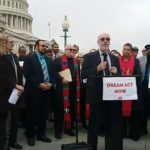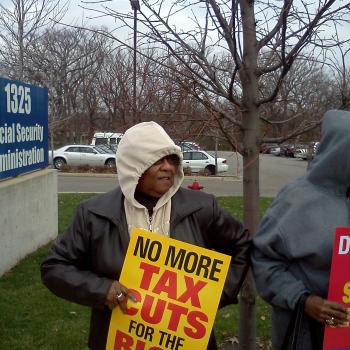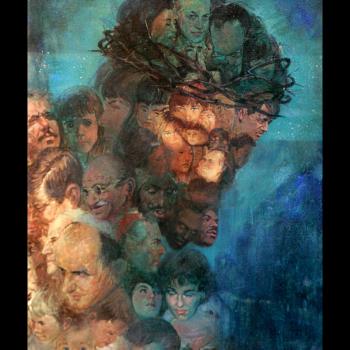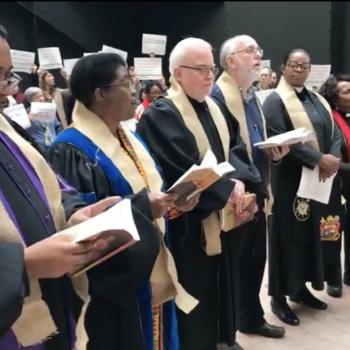 Congress recently passed what they refer to as a tax reform bill. Some call it a pro-growth tax package. Their argument is that if you cut corporate taxes and taxes for the very wealthy it will stimulate growth. Others have called it a con job, arguing it will increase taxes for the middle class without doing anything to create jobs. Listening to this discussion, combined with knowledge of past proposals on the federal budget can leave one feeling a bit dizzy and wondering, to borrow and old expression, “which end is up.” One thing is obvious though, there is not much talk about the poor, the hungry or the marginalized. As a country that claims to be a moral nation founded on Judeo/ Christian principles we seem to have gotten our priorities turned around. We talk about the budget and our tax policies as if they were economic documents. In fact, they are a moral statement on the spiritual and ethical values we as a nation profess. A moral compass as to where we are and where we place our values. Based on what we have seen over the past few months, we have lost our way. We seem to be promoting a belief that our economic policies should determine our moral value rather than our moral values determining our economic policies.
Congress recently passed what they refer to as a tax reform bill. Some call it a pro-growth tax package. Their argument is that if you cut corporate taxes and taxes for the very wealthy it will stimulate growth. Others have called it a con job, arguing it will increase taxes for the middle class without doing anything to create jobs. Listening to this discussion, combined with knowledge of past proposals on the federal budget can leave one feeling a bit dizzy and wondering, to borrow and old expression, “which end is up.” One thing is obvious though, there is not much talk about the poor, the hungry or the marginalized. As a country that claims to be a moral nation founded on Judeo/ Christian principles we seem to have gotten our priorities turned around. We talk about the budget and our tax policies as if they were economic documents. In fact, they are a moral statement on the spiritual and ethical values we as a nation profess. A moral compass as to where we are and where we place our values. Based on what we have seen over the past few months, we have lost our way. We seem to be promoting a belief that our economic policies should determine our moral value rather than our moral values determining our economic policies.
As Christians we haven’t always been in this space. The Gospels are filled with stories of Jesus telling the rich to give all their possessions away if they wanted to enter the kingdom. Matthew 6 says we cannot worship both God and money – we have to choose one or the other. Early Christians lived in community. There were collections of goods and distributions to widows, orphans, and those in need. There was never a discussion of who was deserving or “I worked hard for my money so why should I share it.” This was done to the extent where there was an organized daily distribution to widows. Acts 4:32 says “no one claimed that what they possessed was their own.” This practice carried on for several centuries. St. Ambrose, a 4th century bishop and considered one of the leading theologians of the church said, “It is not anything of yours that you are bestowing on the poor; rather, you are giving back something of theirs. For you alone are usurping what was given in common for the use of all. The earth belongs to everyone, not to the rich.” When Christianity started to become the religion of the powerful rather than the powerless, the theology changed. When the wealthy started to become Christian, Christianity, mostly through the leadership and teaching of St. Augustine, decided that it would not be easier for a camel to get through the eye of a needle than for a rich man to enter the Kingdom of Heaven and private ownership and accumulation of wealth was a good thing. We created a theology, not of building the Kingdom of Heaven as Jesus taught, but rather of going to the Kingdom of Heaven. Over time, saints like St. Francis and St. Clare have tried to return the church to the teachings and writings of our early church mothers and fathers. Today many Orders, like the Franciscans, Columbans, and Sisters of Mercy, still live that way. Individually they own nothing and everything is shared within their communities. I know and work with Franciscan Sisters who are presidents of hospitals and universities as well as Sisters who work at homeless shelters. They all contribute whatever they earn to the community and they all receive the same stipend to live on.
So, how does early Christian theology have anything to do with the tax and budget policies of our leaders today? Well, if our tax and budget policies define our moral values then we should know where those values come from. If we are a Christian nation, as many claim, then we should know what that means from an economic perspective. A group of faith leaders in D.C. issued a statement after the President issued his budget proposal. We called for a Faithful Budget. As our document says, “A Faithful Budget prioritizes the well-being of those who are struggling to overcome poverty or are especially vulnerable, as well as our obligation to future generations through our collective responsibility as stewards of creation. It is a budget that addresses and remedies the inequities that result from institutional racism and systemic injustice and a broken immigration system, creating a world where everyone may realize the potential of all that God intends. It is a budget that enhances the transformation of conflict with creative and courageous nonviolent peacebuilding, thus cultivating a more sustainable just peace.” It seems simple enough, seems like it comes right out of the Gospels, the Qur’an, the Torah and other spiritual texts. The Prophet Isaiah tells us, “If you offer your food to the hungry and satisfy the needs of the afflicted, then your light shall rise in the darkness and your gloom be like the noonday….you shall raise up the foundations of many generations; you shall be called the repairer of the breach, the restorer of streets to live in” (58:10-12). The Holy Qur’an says: “Never shall you attain to true piety unless you spend on others out of what you cherish yourselves; and whatever you spend–verily, God has full knowledge thereof“ (The Holy Qur’an 3:92).
It is not just our political institutions that have lost their way but our businesses as well. In the early 70’s a well renowned conservative economist, Milton Friedman introduced the theology of profit maximization for corporations at the expense of the common good. Friedman taught that since stockholders were the owners of the company the only duties of the managers were producing the greatest return for these owners. Stockholder wealth maximization became the sole purpose of management. Friedman’s theory became the norm and was taught at most business schools. Workers were not important, environment was not important, communities were not important, and natural resources were there for the corporations to use for the benefit of the wealthy stockholders. Because Freidman was a well-respected economist, he served as an advisor to several presidents. His theories not only helped shape corporate policies but government as well. So, our policies began to move away from protecting the poor, the workers, communities, the environment and towards helping corporations and the wealthy.
But Freidman’s theory was not the only choice. Ian Mitroff, an American organizational theorist, wrote a book in 1983 called Stakeholders of the Organizational Mind. This was followed up by articles by Edward Freeman, a philosopher and professor of business administration arguing for the stakeholder philosophy as opposed to shareholder. According to this theory, business ethics should be aware and answerable on how the business impacts all stakeholders. They suggest that a stakeholder is any and all people and resources that a business impacts or may impact. This would include workers, customers, suppliers, communities, government in addition to stockholders. These theories recognize that profit is only one part of the equation.
So how did we get here? Charles Eisenstein in his book Sacred Economics says: “We have lived in an Age of Separation. One by one, our bonds to community, nature, and place have dissolved, marooning us in an alien world. The loss of these bonds is more than a reduction of our wealth, it is a reduction of our very being. The impoverishment we feel, cut off from community and cut off from nature, is an impoverishment of our souls. That is because, contrary to the assumptions of economics, biology, political philosophy, psychology, and institutional religion, we are not in essence separate beings having relationships. We are relationship.” This is similar to what the 17th century Catholic Saint John of the Cross taught us, namely that human desire is unlimited. The heart of human beings is not satisfied with less than Infinite. This infinite is clearly God himself. Our deepest human desire is a desire of God. When we turn away from God, we no longer consider God’s creation and all that it encompasses as sacred. A result is that our unlimited human desire for God expresses itself in materialism and consumerism. We have lost our connection to God and therefore are experiencing the consequence of humanity without God.
So, if we really want to bring about change we should stop wasting our time nibbling at the edges and begging for crumbs off the table. We should, as Pope Francis called for, have a “Bold Cultural Revolution.” A revolution that redefines how we see ourselves in relation to all of God’s creation. A revolution where we think of the Earth as God’s earth and our common home, not as pieces of property that we claim as our own and feel we have the right to do with what we want. A revolution where we consider everyone-our sisters and brothers regardless of the color of their skin, their faith tradition, where they come from or their sexual orientation. A revolution where a federal budget would promote a compassionate and comprehensive vision for the future. This is not a revolution to change our economic system between capitalism, communism or socialism but a system based on our common home and the common good.
Dom Hélder Pessoa Câmara, a Brazilian 20th century Catholic bishop, is famous for saying “When I give food to the poor, they call me a saint. When I ask why they are poor, they call me a communist.” So some will say this is promoting communism. Someone recently wrote accusing me of being an avowed communist. I have no idea what that means. I am a Christian and follower of the teachings of Jesus and as a member of the Franciscan family, the example lived by St. Francis and St. Clare. I am not sure what that would make me. Though Thomas Merton in his book New Seeds of Contemplation said: “You cannot be a Christian unless you are also a communist.” But that is fodder for another blog.
Peace and All Good













